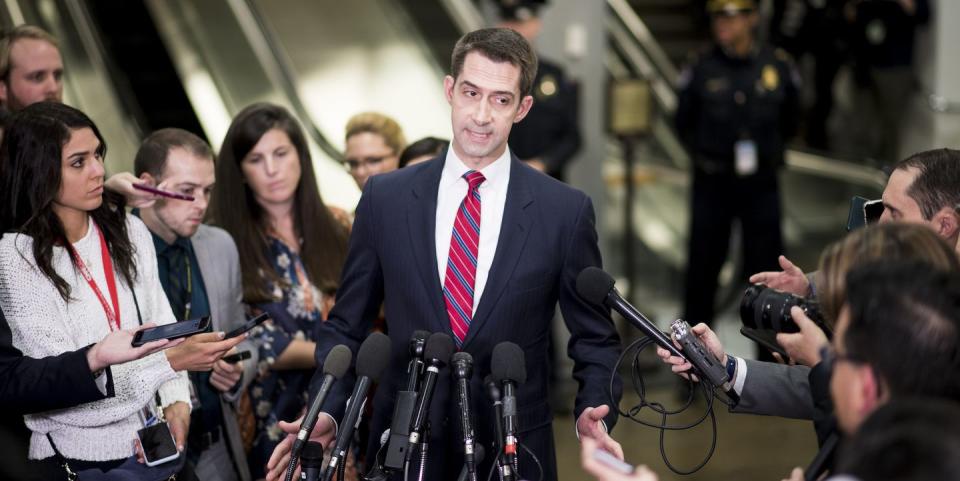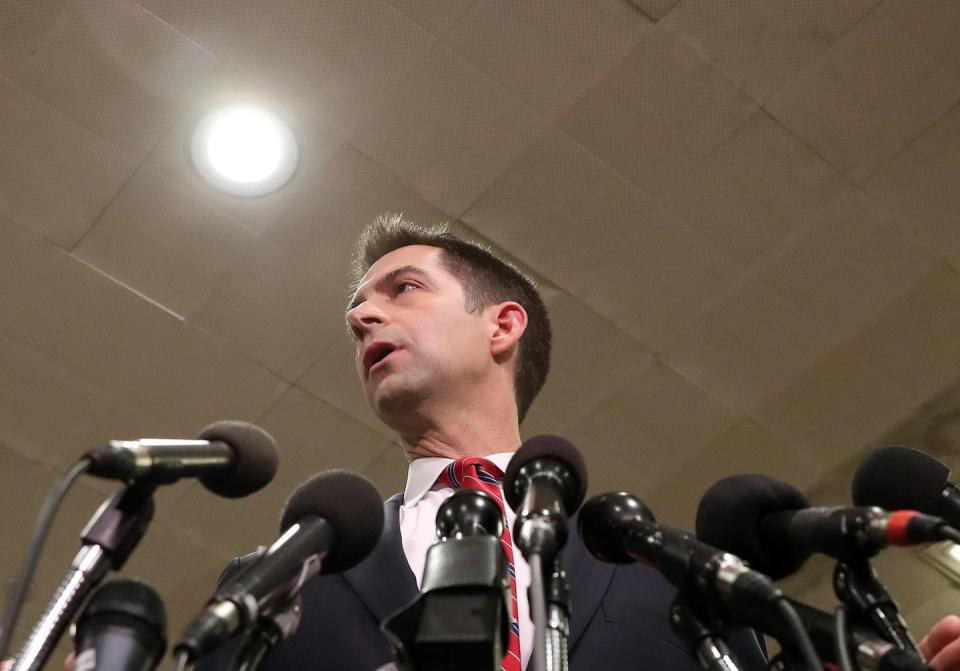Tom Cotton Is Not Trying to Persuade You. He's Trying to Bludgeon You.

After the New York Times published a fascist screed from a sitting United States senator on Wednesday, in which Tom Cotton argued—using false premises—for deploying the military to crush the ongoing protests in cities across America, a predictable argument erupted in the public square.
"Free speech!" some shouted, as if the First Amendment grants everyone the inalienable right to have their shitty opinions published in the Paper of Record and disseminated to as many people as possible. You have every right to use your speech to advocate for violent government suppression of speech, even on the eve of the 31st anniversary of the Tiananmen Square massacre, but no one is obligated to hand you a megaphone. It's not like Cotton could not have found some other platform from which to spew this constitutionally heinous bilge. The Times' decision to grant him their imprimatur, without challenging him in any way or providing readers with relevant context, is a moral atrocity. Make no mistake: his prescription would lead to the killing of American citizens in the streets of their own cities. He said so himself.

But there was also another argument in play, and it betrayed an attitude towards the rhetoric of authoritarianism that is dangerously naive. It's a variant of the "sunlight is the best disinfectant" argument, and it holds that fascist rhetoric like this should be widely and loudly trumpeted so that it can be dismantled using Facts and Logic. Throw it into the "marketplace of ideas," where its value will swiftly plummet. But this represents a comprehensive failure to grapple with the nature of fascism, which is not bound by concerns about what is true or even what was said five minutes ago. It cannot be defeated by Reason. It continually shape-shifts and changes form, rejecting previous bedrock principles in favor of their opposites whenever it is convenient. It is necessarily absurd, because it is just an elaborate costume for a very simple message: "Obey, or I will hurt you."
Jean-Paul Sartre illustrated this in 1946, a time when the world had become well acquainted with the form.
Never believe that anti-Semites are completely unaware of the absurdity of their replies. They know that their remarks are frivolous, open to challenge. But they are amusing themselves, for it is their adversary who is obliged to use words responsibly, since he believes in words. The anti-Semites have the right to play. They even like to play with discourse for, by giving ridiculous reasons, they discredit the seriousness of their interlocutors. They delight in acting in bad faith, since they seek not to persuade by sound argument but to intimidate and disconcert. If you press them too closely, they will abruptly fall silent, loftily indicating by some phrase that the time for argument is past.
The bad-faith absurdity of these arguments is clear if you allow yourself to stop taking them at face value for a moment. In the case of Cotton's op-ed, he argues for military intervention to crush antiracist protests in part on the basis that the military has previously intervened domestically to enforce antiracist policies—namely, school integration. This is a farce. It is something beyond offensive or illogical. It is an assault on the mind, a twisting of first principles for degenerate ends.
Meanwhile, some insist his speech must be published in the nation's largest and most prestigious newspaper, even if it expressly advocates for the violent suppression of speech. And then, when legions of New York Times staffers spoke out to denounce the op-ed, their exercise of their free-speech rights to criticize the decision to publish was decried as "censorious" and even "a coup." What, dude? Apparently, one opinion must be blasted out to the world, even if it relies on blatant false claims in its basic premise, because it comes from a United States senator. Other opinions about how that opinion is shitty and should not be blasted out are assaults on free speech. Will the Times publish my op-ed titled, "Tom Cotton Is Fashy Big Bird"? Subject it to the Marketplace of Ideas! Or would the editors make the decision, as is their right and their duty, that the argument is based on false premises, or outside the bounds of acceptable discourse on their platform?
But no need to get caught up in all that. It is free speech for me, but not for thee, because it's often not actually about free speech. In some cases, these folks have just lost the plot. They've twisted their brains around one too many times over the years, and now they're thinking in knots. But for others, it is about using rhetoric not to persuade, but to bludgeon your opponents until they surrender and accept your authority. That's the president's approach. If that means peddling unchecked lies, so be it. If it means turning basic reason on its head, so be it. If it means denying what you yourself said yesterday, on video, so be it. It is, in Sartre's words, "to intimidate and disconcert." It is speech as a weapon, a grinding force to wear people down until they accept the primacy of authority not because it has legitimacy, but because it has power. It is scary to watch someone, as Masha Gessen put it, "assert power over truth itself." It's enough to make you think it's not worth stepping out of line.

The cognitive dissonance of authoritarian rhetoric has also been apparent in the case of Drew Brees—or, more precisely, in the aftermath of his comments Wednesday, in which he insisted on pretending—even now!—that demonstrations during the national anthem are somehow about The Troops. It is not about the military, it's a demand that the United States live up to his professed values. (Pointing out ways the country could be better seems like an expressly patriotic act. Yet somehow, protest is routinely derided as anti-American. Notice, again, the absurdist effort to continually remake the playing field. Colin Kaepernick's biggest detractors now spend their time braying for peaceful protest, all the while refusing to grapple with the actual issues at hand.) Brees, who has now apologized, faced swift and harsh criticism from his colleagues in the NFL—including his teammates on the New Orleans Saints—and beyond, as in the case of LeBron James.
But not from Laura Ingraham of Fox News. Wait, speaking of LeBron...
Laura Ingraham’s comments on LeBron James Vs. Laura Ingraham’s defense of Drew Brees pic.twitter.com/Ki3uvK02o2
— Acyn Torabi (@Acyn) June 4, 2020
Free speech for me, but not for thee. LeBron James should "shut up and dribble," while Drew Brees is..."a person." Whoops! Talk about saying the quiet part out loud. I wonder why Drew is a person of worth who deserves to speak his mind about how this country is run, but LeBron James is not. What's different about them? It's almost like Laura Ingraham and her fellow travelers believe America is for Certain People, and everyone else should just be happy to be here. They certainly don't get a seat at the table. It's not about free speech, or any principles at all. Nobody said Drew Brees is not allowed to speak. They criticized what he said. It is Ingraham who's policing here, because their real message is "shut up so I can keep talking"—and making the rules.
You Might Also Like

